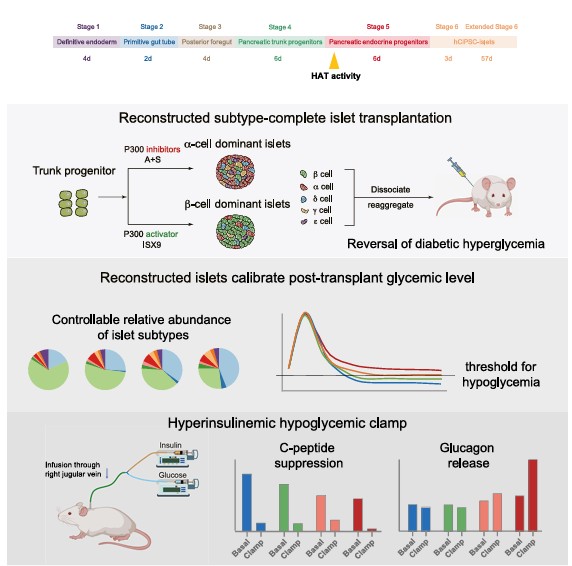Peking University, August 29, 2025: Professor Deng Hongkui’s team from the Peking University School of Life Sciences recently made the first successful differentiation of human pluripotent stem cells into fully endocrine-subtype-complete islets. These islets efficiently respond to blood glucose concentration changes, demonstrating very effective blood sugar control capabilities. Their findings have been published in the academic journal Cell Stem Cell, titled “Reconstruction of endocrine subtype-complete human pluripotent stem cell-derived islets with capacity for hypoglycemia protection in vivo.”
Graphical Abstract
Why it matters
Transplantation of pluripotent stem cell-derived islets (PSC-islets) represents a promising therapy for restoring blood sugar control in diabetes, owing to the self-renewal and differentiation capacities of PSCs, overcoming the problem of scarcity of cadaveric islets required for islet transplantation. This research has succeeded for the first time in the challenging task of reconstruction of PSC-islets comprising all five(α, β, δ, ε, and γ) endocrine subtypes. These PSC-islets have proved efficient in protecting against hyperglycemia (high blood sugar) as well as hypoglycemia (low blood sugar) in diabetic mouse models, showcasing significant potential in improving treatments for patients of type 1 diabetes.
Key findings
1. Quantitative confirmation that reconstructed islets with optimized composition better maintains physiological blood glucose levels.
2. The hypoglycemia-protective function of non-β cells (particularly α and δ cells) effectively prevent hypoglycemia under conditions of insulin excess or fasting.
3. Reconstructed islets restore the body's hypoglycemic counterregulatory responses.
4. The endocrine composition (makeup and relative proportions of different hormone-producing cell types) of PSC-islets—not just β cell abundance—determines their ability to regulate glucose safely. Incorporating and balancing non-β endocrine cells is essential for restoring native-like, bidirectional glycemic control and protecting against hypoglycemia.
Future implications
This study has established the first islet preparation system capable of regulating the ratio of five endocrine cell types in a precise manner. This opens a path toward safer stem cell-based diabetes therapies, providing enhanced safety assurance for the clinical translation of stem cell-derived islets and accelerating the clinical application of cellular therapies for diabetes.
*This article is featured in PKU News "Why It Matters" series.
Read more here: https://www.cell.com/cell-stem-cell/fulltext/S1934-5909(25)00263-2
Written by: Phoon Hui Yin, Andrena
Edited by: Chen Shizhuo
Source: PKU News (
Chinese)
